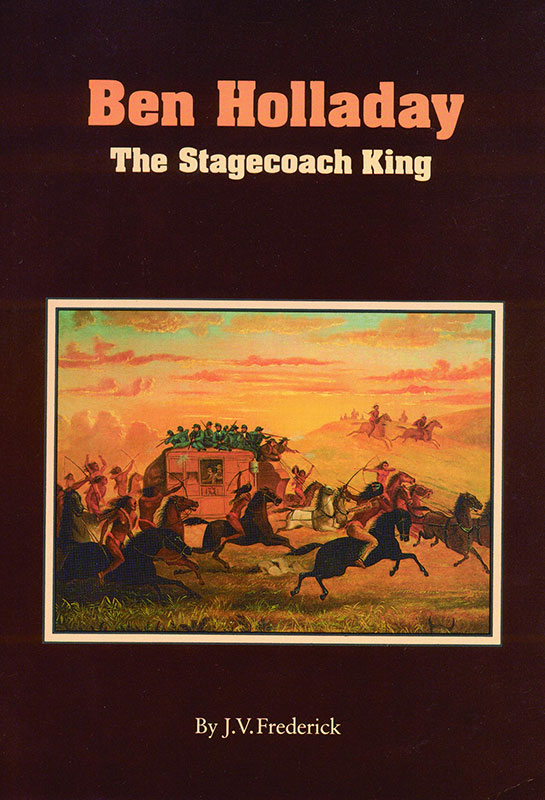J.V. Frederick, Ben Holladay, The Stagecoach King (1940)
 This book is something of a biography of Ben Holliday, who developed a virtual monopoly on stagecoaching in the 1860s west. He loaned money to Russell, Majors & Waddell and ended up buying them out after Russell’s embezzlement scandal in 1861. He’s also the man who purportedly pushed Jack Slade (who became Holladay’s employee after the buyout) to kill Old Jules Beni (founder of Julesburg).
This book is something of a biography of Ben Holliday, who developed a virtual monopoly on stagecoaching in the 1860s west. He loaned money to Russell, Majors & Waddell and ended up buying them out after Russell’s embezzlement scandal in 1861. He’s also the man who purportedly pushed Jack Slade (who became Holladay’s employee after the buyout) to kill Old Jules Beni (founder of Julesburg).
Unfortunately, the book is not so much a biography as a review of stagecoaching in the west. It may be that I’ve read too many books on this period of US history in too short a span of time, but much of what is in this book is in other books, only better stated elsewhere. I found myself skipping pages and even whole chapters as they contained little new information.
To the extent the book purports to be a biography, it offers a thumbnail sketch of Holliday’s early life, and only praises Holladay and his accomplishments in later life. The author spends more time describing Holladay’s Weston mansion than it does his development as the Stagecoach King. The book is hagiography, offering only praise and nothing critical of Holladay. He was known for literally running prize horses to their death to win a bet, or merely to set a new time record, a trait the author shrugs off with a joke. A long chapter on “Indian Troubles” discussed the “troubles” only insomuch as they inconvenience Holladay and shows how resilient he was in overcoming setbacks.
Notably, the author states that Holliday “surrounded himself with evidence of culture as well as with luxuries. There was a large classical library [in his Washington mansion] and also many other valuable books, oil paintings by great masters, and fine tapestries.” Yet contemporaries, even people who respected Holladay, described him as “illiterate, coarse, boastful, false, and cunning.” Apparently, he was known for being “clever, shrewd, cunning, illiterate, coarse, and completely unscrupulous,” “wholly destitute of fixed principles of honesty, morality, or common decency.” After buying a large home, “he remodelled it and immediately installed a harem of high class prostitutes.” (All quotes taken from MacColl, E. Kimbark (November 1976). The Shaping of a City: Business and politics in Portland, Oregon 1885 to 1915 on Wikipedia.) None of which is mentioned in this book.
The main point being, I did not learn anything from this book I hadn’t already known about Holladay from elsewhere. Additionally, between the author’s writing style, which tends to change topics midd-paragraph, and the now all-too-frequent use of only disparaging, racist language toward Native Americans, this book was mostly a giant waste of time for me. The appendices seem to hold a lot of detailed information about mail contracts, station names and distances, purported losses due to wars on the plains, etc. And that could be useful for further research. But again, not much insight into the great man himself.
Then again, as I said earlier, maybe I need to take a break on my historical nonfiction reading so I might come back to it with a less jaded attitude.